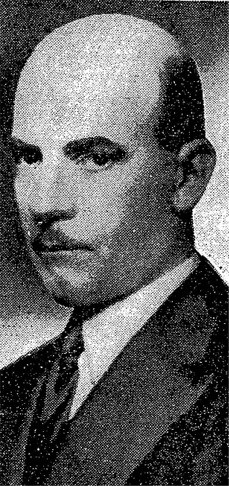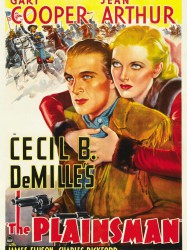Courtney Ryley Cooper est un Scénariste Américain né le 31 octobre 1886 à Kansas City (Etats-Unis)

Courtney Ryley Cooper (October 31, 1886 – September 29, 1940) was an American circus performer, publicist and writer. During his career he published over 30 books, many focusing on crime; J. Edgar Hoover considered him at one time "the best informed man on crime in the U. S." He was also an expert on circuses, and was the chief publicist for Ringling Brothers, Barnum & Bailey Circus at the time of his death.
Later, he worked as a newspaper reporter for The Kansas City Star, New York World, the Chicago Tribune and the Denver Post. In 1914, as a result of his work at the Post, he became the press agent for the Sells-Floto Circus, which was owned by the owners of the Post. The Sells-Floto had absorbed the assets of William "Buffalo Bill" Cody's Wild West Show, including Buffalo Bill himself.
On August 1, 1918, Cooper joined the United States Marine Corps. He rose to the rank of second lieutenant and was sent to France to conduct historical research on the Marines.
In the 1920s and 1930s, Cooper wrote screenplays, including the narrative for the Frank Buck film Wild Cargo and the Art-O-Graf film Riders of the Range, short stories, novels, magazine articles, and popular non-fiction books. He published 30 books during his career. Most of his non-fiction work focused on two subjects — the circus and crime. He was Annie Oakley's first biographer. His books Here's to Crime (1937), Ten-Thousand Public Enemies (1935) and Designs in Scarlet (1939) championed the cause of the young Federal Bureau of Investigation and made the case that corrupt local governments and police forces permitted lawlessness to flourish in many parts of the United States.
Cooper's work was much admired by FBI Director J. Edgar Hoover, who once said he is "the best informed man on crime in the U. S." — even allowing Cooper access to FBI case files. Cooper is widely believed to have ghostwritten the book Persons in Hiding (1938) as well as a number of magazine articles for Hoover.
In 1940, Cooper worked with comic strip artist Dale Messick, and suggested the first storyline for Messick's Brenda Starr.
Cooper wrote extensively on the danger of illicit drugs, particularly marijuana. He collaborated with Federal Bureau of Narcotics Director Harry Anslinger on the article "Marijuana, Assassin of Youth," which originally appeared in The American Magazine in July 1937.
Some of Cooper's correspondence with Hoover is archived at the University of Alaska Anchorage Library.
Source : Wikidata
Courtney Ryley Cooper

- Infos
- Photos
- Meilleurs films
- Famille
- Personnages
- Récompenses
Nationalité Etats-Unis
Naissance 31 octobre 1886 à Kansas City (Etats-Unis)
Mort 29 septembre 1940 (à 53 ans) à New York (Etats-Unis)
Naissance 31 octobre 1886 à Kansas City (Etats-Unis)
Mort 29 septembre 1940 (à 53 ans) à New York (Etats-Unis)
Biographie
Courtney Ryley Cooper was born in Kansas City, Missouri on October 31, 1886. At the age of 16, he left home to join a traveling circus and eventually became a circus clown, working his way up to general manager of the circus.Later, he worked as a newspaper reporter for The Kansas City Star, New York World, the Chicago Tribune and the Denver Post. In 1914, as a result of his work at the Post, he became the press agent for the Sells-Floto Circus, which was owned by the owners of the Post. The Sells-Floto had absorbed the assets of William "Buffalo Bill" Cody's Wild West Show, including Buffalo Bill himself.
On August 1, 1918, Cooper joined the United States Marine Corps. He rose to the rank of second lieutenant and was sent to France to conduct historical research on the Marines.
In the 1920s and 1930s, Cooper wrote screenplays, including the narrative for the Frank Buck film Wild Cargo and the Art-O-Graf film Riders of the Range, short stories, novels, magazine articles, and popular non-fiction books. He published 30 books during his career. Most of his non-fiction work focused on two subjects — the circus and crime. He was Annie Oakley's first biographer. His books Here's to Crime (1937), Ten-Thousand Public Enemies (1935) and Designs in Scarlet (1939) championed the cause of the young Federal Bureau of Investigation and made the case that corrupt local governments and police forces permitted lawlessness to flourish in many parts of the United States.
Cooper's work was much admired by FBI Director J. Edgar Hoover, who once said he is "the best informed man on crime in the U. S." — even allowing Cooper access to FBI case files. Cooper is widely believed to have ghostwritten the book Persons in Hiding (1938) as well as a number of magazine articles for Hoover.
In 1940, Cooper worked with comic strip artist Dale Messick, and suggested the first storyline for Messick's Brenda Starr.
Cooper wrote extensively on the danger of illicit drugs, particularly marijuana. He collaborated with Federal Bureau of Narcotics Director Harry Anslinger on the article "Marijuana, Assassin of Youth," which originally appeared in The American Magazine in July 1937.
Some of Cooper's correspondence with Hoover is archived at the University of Alaska Anchorage Library.
Le plus souvent avec
Filmographie de Courtney Ryley Cooper (9 films)
Scénariste

Une Aventure de Buffalo Bill (1936)
, 1h53Réalisé par Cecil B. DeMille, Arthur Rosson
Origine Etats-Unis
Genres Guerre, Biographie, Action, Historique, Romance, Western
Thèmes Politique
Acteurs Gary Cooper, Jean Arthur, Charles Bickford, James Ellison, Porter Hall, Paul Harvey
Note67%





À la fin de la Guerre de Sécession, les trafiquants d'armes fournissent les Indiens en fusils à répétition. Buffalo Bill et Wild Bill Hickok soupçonnent John Latimer d'être le chef du réseau. Latimer déclenche une attaque indienne; Hickok y fait front et parvient à arracher des mains des Indiens la jeune aventurière Calamity Jane. Mais, peu après, tous deux sont faits prisonniers…

Wild Cargo (1934)
, 1h36Réalisé par Armand Denis
Origine Etats-Unis
Genres Action, Aventure
Acteurs Frank Buck
Rôle Concepteur de dialogues
Note60%






The Last Frontier (1932)
, 3h33Réalisé par Spencer Gordon Bennet
Origine Etats-Unis
Genres Action, Aventure, Western
Acteurs Lon Chaney, Jr., Dorothy Gulliver, Francis X. Bushman, Jr., William Desmond, Joe Bonomo, Pete Morrison
Note61%





The outlaw "Tiger" Morris attempts to drive setters off their land in order to acquire the local gold deposits. A crusading newspaper editor, Tom Kirby, becomes the masked vigilante, The Black Ghost, to stop him.

Le Torrent fatal (1929)
, 1h26Réalisé par Frank Lloyd
Origine Etats-Unis
Genres Drame, Romance
Thèmes Gangsters
Acteurs Richard Barthelmess, Betty Compson, William Holden, William Holden, Randolph Scott, Richard Cramer
Rôle Histoire
Note60%





Jerry Larrabee (Richard Barthelmess) is framed by rival gangster Spadoni (Louis Natheaux) and sent to prison, where he is befriended by a kind and understanding warden (William Holden). Through the warden's patient influence, Jerry becomes interested in music and forms a prison band, broadcasting over the radio. Jerry's singing deeply moves his radio listeners and soon Jerry is given a pardon by the governor.

The Trail of the Tiger (1927)
Réalisé par Henry MacRae
Origine Etats-Unis
Acteurs Jack Mower, John Webb Dillon, Jack Richardson

The Last Frontier (1926)
Réalisé par George B. Seitz
Origine Etats-Unis
Genres Western
Acteurs William Boyd, Marguerite De La Motte, Jack Hoxie, J. Farrell MacDonald, Frank Coghlan, Jr., Mitchell Lewis
Note60%






The Fast Express (1924)
Réalisé par William Duncan
Origine Etats-Unis
Genres Drame
Acteurs Edith Johnson, William Duncan, Harry Woods, John Hay Cossar, Harry Carter

Riders of the Range (1923)
Réalisé par Otis Thayer, Otis B. Thayer
Origine Etats-Unis
Genres Western
Acteurs Edmund F. Cobb, Helen Hayes
Rôle Histoire
A growing number of cattle raids prompts the cattlemen to call on their cattlemen's association president Martin Lethbridge to investigate. Sheep Ranchers are suspected, who led by Gregg Randall blame the cattlemen for increased casualties among the sheep herds. Letherbridge falls in love with Randall's daughter, Dolly, and eventually exposes Blunt Vanier as the cause of the conflict.

Step on It! (1922)
, 50minutesRéalisé par Jack Conway
Origine Etats-Unis
Genres Western
Acteurs Hoot Gibson, Edith Yorke, Frank Lanning, Victor Potel, Barbara Bedford, Joseph W. Girard
Rôle Ecrivain

Desperate Trails (1921)
, 50minutesRéalisé par John Ford
Origine Etats-Unis
Genres Western
Acteurs Harry Carey, Irene Rich, Edward Coxen, Barbara La Marr, George Siegmann, Charles Inslee
Rôle Histoire
Note44%





As described in a film publication, Bart Carson (Carey) is in love with Lou (La Marr) and even goes to jail to save Walter A. Walker (Coxen), a man she says is her brother but who is really a husband who has deserted his wife and two children. After he learns the truth, Bart breaks out of jail and trails Walter, who falls off a train trying to escape. Bart then seeks refuge in a cabin with Mrs. Walker (Rich), where he is captured, but the officials have learned the truth and promise him a pardon.
 Connexion
Connexion



